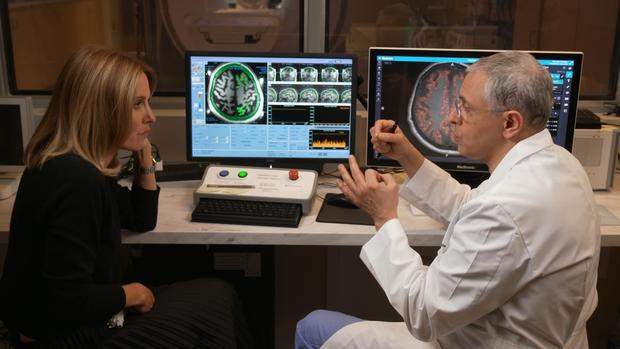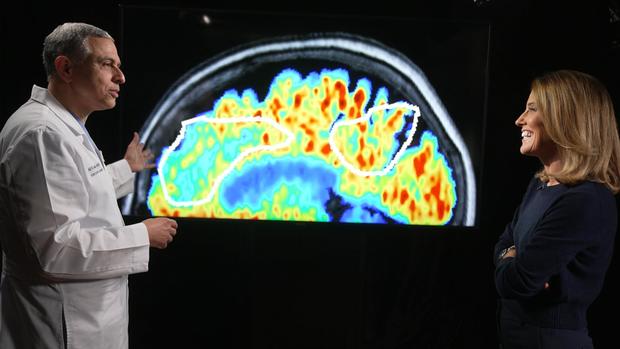The misery of witnessing someone deteriorate as Alzheimer’s disease robs them of their memory and, ultimately, their identity is well known to those who have experienced it themselves. We’ll demonstrate an experimental strategy to attempt to prevent Alzheimer’s disease tonight. Although it has only been tried on a small number of patients, we were interested in it because of the physician, Dr. Ali Rezai, who we first met on 60 Minutes two decades ago. Pioneering in the field of neuroscience, Dr. Rezai has created therapies for conditions including Parkinson’s disease and other brain illnesses. We have been following this maestro of the mind for the past year as he tried to use ultrasound to slow the worst signs of Alzheimer’s disease and its progression. We witnessed an innovative method of brain surgery that involved no cutting.
Dr. Ali Rezai: If we can, we should not be doing brain surgery.
Sharyn Alfonsi: You operate on the brain!
Dr. Ali Rezai: I am, but I really shouldn’t be working in this field because brain surgery involves opening the skull and cutting the skin. It might be savage.
It resembled a scene out of a science fiction film. A patient wearing a halo was inserted into a tube.as a group of medical professionals work on his brain from the other side of the glass.

Dr. Ali Rezai gave us the opportunity to observe his ground-breaking attempt to employ ultrasonography to halt the cognitive deterioration of three Alzheimer’s patients. No one has ever done this before.
Dr. Ali Rezai: Miracle treatments are not available here. It’s pushing the boundaries and improving medicine while taking measured risks.
These red areas in the patient’s brain scans are the center of attention for Dr. Rezai and his colleagues. The densest beta-amyloid protein is indicated by the red. That sticky protein is thought to be a significant cause of Alzheimer’s by interfering with brain cell communication.
Dr. Ali Rezai: It accumulates far more quickly in Alzheimer’s patients. We refer to these protein clumps that accumulate over time as plaques. Similar to artery-clogging plaques, they never stop building and affecting function.
There are currently two FDA-approved medications available that can aid in the removal of brain plaque. In 2021, Aducanumab received approval.Lecanemab came next last year. Though they both act slowly, they are administered intravenously.
Dr. Ali Rezai: Typically, you walk into the clinic, and you have an IV, and you get the antibody infusion over one to two hours. And for a minimum of eighteen months, you must perform it once or twice a month. And the brain keeps developing during those 12 to 18 months. Alzheimer’s disease is here to stay.
With ultrasonography, a tool that has been used for seven decades to provide clinicians with an image of the organs and embryonic development, Dr. Rezai believed he could solve that issue.
He choose ultrasound because it can be concentrated, much like light through a magnifying glass, and it can readily pass through the skull to help break down the blood-brain barrier so that medications can enter the body more quickly.

Ali Rezai, M.D. In this manner, we are able to deliver the therapeutic payload with high penetration precisely where it is needed. However, we must exercise caution as we want to make sure that this is safe. Don’t try to give too much away. Do not want to breach the blood-brain barrier excessively.
You have to go back to 2002, when a story about Dr. Rezai’s treatment of Parkinson’s illness by Morley Safer originally drew our attention.
In a 2002 Morley Safer article, Dr. Rezai said, “Look up.Display your teeth to me; extend your tongue.Excellent.”
One of the first doctors to implant a pacemaker-like device in the brain to stop Parkinson’s patients’ uncontrollable movements was Dr. Rezai.
Dr. Rezai in a 2002 Morley Safer article: “It’s like traveling through a labyrinth as in the Greek myth and around every corner you have that bloodthirsty monster that can jump on you so you want to be careful to avoid these areas.”
Advanced Parkinson’s patients now routinely undergo that type of implant surgery. Following this, Dr. Rezai presented his Parkinson’s study findings to Congress and the White House, wrote hundreds of scholarly publications, and obtained dozens of patents. Though he had the option to attend any large city research institution, he decided to try something different and relocated to Morgantown, West Virginia, where he currently serves as the executive director of the Rockefeller Neuroscience Institute: true to form.
In addition to experimenting with the same ultrasound treatment on forty-five more patients suffering from addiction, Dr. Ali Rezai is considering extending the application of ultrasonography to treat patients suffering from obesity and other brain problems.
Ali Rezai, M.D. This is groundbreaking research, so take it seriously. We still need to find out more. We must confirm our results.
Sharyn Alfonsi: Is there a risk while making a fast move toward something?
Ali Rezai, M.D. Risk is always there, yet without it, advancement and discoveries are impossible. However, we must move forward and accept the danger because there are already people suffering from addiction and Alzheimer’s; there is no reason to wait another ten or twenty years. Take action right now.
